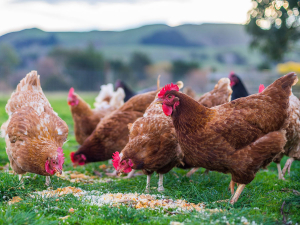Restrictions on fruits, vegetables movement in Mt Roskill
Legal controls on the movement of fruits and vegetables are now in place in Auckland’s Mt Roskill suburb, says Biosecurity New Zealand Commissioner North Mike Inglis.
 Biosecurity New Zealand has placed a second Otago farm on ‘a restricted place’ notice following the discovery of avian influenza in the region earlier this week.
Biosecurity New Zealand has placed a second Otago farm on ‘a restricted place’ notice following the discovery of avian influenza in the region earlier this week.
Biosecurity New Zealand has placed a second Otago farm on ‘a restricted place’ notice following the discovery of avian influenza in the region earlier this week.
The news comes as the culling of chickens in two sheds on a farm managed by Mainland Poultry begins.
Biosecurity New Zealand deputy director-general Stuart Anderson says the restricted place notice on the second farm, a small free-range farm located near Dunedin, is precautionary at this stage.
“As is normal in biosecurity responses we always investigate where illness is identified,” Anderson says.
The second property has approximately 6,000 birds, with a small number of deaths. Testing is currently underway.
Anderson says the cull at Mainland Poultry’s egg farm is being carried out by the business and supported by Biosecurity New Zealand.
“The cull is expected to take two to three days, using the existing industry standard practice of CO2 containerised gas, which farms regularly use to euthanise chickens,” he says.
“The carcasses, along with litter from the affected sheds, will be transported to a secure landfill in Southland, equipped to take this kind of waste,” he adds.
“The carcases will be loaded directly onto trucks with a leak-proof plastic lining, which has been thoroughly tested.
“It’s important to point out the landfill has specific features to prevent the leaching of materials into the environment, including impermeable layers, and a process of routine monitoring.
“The disposal will be in a deep pit and in an area well away from any public access, and the landfill will be closed during this process.”
Anderson says testing has been conducted at the smaller poultry farm near Dunedin.
That property is not owned by Mainland Poultry and he says Biosecurity New Zealand is investigating whether there are any links between the two properties.
He says testing is also being carried out on birds in the remaining sheds on Mainland Poultry’s egg farm and at other properties of interest.
“We will continue rigorous testing over the coming days and weeks and will take action as required,” Anderson says.
He says there had been no reports of concern about other ill or dead birds on other poultry farms.
“Contract tracing has revealed limited movements between Mainland Poultry’s affected farm and some of the other poultry farms in the area.”
Anderson says the risk to human health still remains low, with no concerns for food safety or wildlife.
“Avian influenza viruses are killed by cooking, so it remains safe to eat thoroughly cooked egg and poultry products,” he explains.
“Raw eggs have always been considered a high-risk food. Our advice remains not to consume or serve raw eggs, especially to those with low or compromised immune systems, as the eggs may contain harmful pathogens, including salmonella.”
The 10-kilometre buffer zone around Mainland Poultry’s egg farm will now be referred to as an enhanced surveillance zone.
Biosecurity New Zealand will be increasing its presence on the ground in Otago and has set up a regional control centre today to manage the situation.
“Over 100 staff across MPI, including frontline biosecurity, trade and market access, veterinarians, agriculture, communications, and food safety are contributing to the response and this number is increasing daily as required, both on the ground in Otago and in our operations centre,” he concludes.
The World Wide Sires National All Day Breeds Best Youth Camp Best All Rounder plaudit has become family affair, with 2026 Paramount Cup winner Holly Williams following in her sister Zara's footsteps.
DairyNZ is giving New Zealand farmers a unique opportunity to gain hands-on governance and leadership experience within the dairy sector.
Herd improvement company LIC has posted a 5.2% lift in half-year revenue, thanks to increasing demand for genetics.
According to the latest Fresh Produce Trend Report from United Fresh, 2026 will be a year where fruit and vegetables are shaped by cost pressures, rapid digital adoption, and a renewed focus on wellbeing at home.
The Roar is a highlight of the game hunting calendar in New Zealand, with thousands of hunters set to head for the hills to hunt male stags during March and April.
OPINION: The past few weeks have been tough on farms across the North Island: floods and storms have caused damage and disruption to families and businesses.

OPINION: Meanwhile, red blooded Northland politician Matua Shane Jones has provided one of the most telling quotes of the year…
OPINION: This old mutt has been around for a few years now and it seems these ‘once in 100-year’ weather…